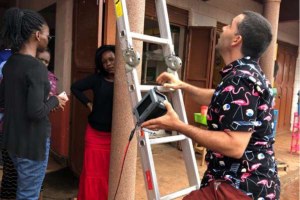There is a lack of air pollution monitoring in sub-Saharan Africa. Developing a low-cost and efficient method to conduct air monitoring in the region can help estimate exposure to air pollution for epidemiology research.
Dr. Eric S. Coker, Assistant Professor in the Department of Environmental and Global Health, and faculty member of the Warren B. Nelms Institute, has addressed this issue in the paper titled “A Land Use Regression Model using Machine Learning and Locally Developed Low Cost Particulate Matter Sensors in Uganda.”
The paper is forthcoming in the Environmental Research journal. Dr. Coker is the corresponding author of the paper, along with co-authors A. Kofi Amegah, Ernest Mwebaze, Joel Ssematimba, and Engineer Bainomugisha.
“The major impact of this work relates to the fact that there is currently very little air quality monitoring data in sub-Saharan Africa. Without air monitoring data, researchers and policy makers cannot assess or address the local impacts and sources of air pollution in the region,” Dr. Coker said.
The paper describes the first particulate matter (PM) land use regression prediction model for Africa that combines data from low-cost air quality sensors with machine learning algorithms. The paper also compares the accuracy of the PM data collected from the low-cost sensors against PM data collected from reference monitors in Kampala, Uganda.
These low-cost sensors are unique because they were designed and fabricated locally in Uganda by a project known as AirQo. The AirQo sensors are IoT-enabled and upload data to a cloud for real-time data visualization. There is also an AirQo app available for smartphone users to explore air quality for their neighborhoods in real-time.

“Our paper brings to light that using locally developed low-cost sensors can rapidly increase the amount of air quality data to inform research and air quality management in the sub-Saharan Africa region,” Dr. Coker said. “We plan to use our developed model for future air pollution epidemiology research.”
Dr. Coker’s work on this paper has enabled him to expand his network of collaborators internationally and allowed him to branch out into applying machine learning methods.
“This was my first attempt at using such tools and thus gives me a new research path towards integrating machine learning tools in my research. I am really excited about this,” he said.
“I hope this work will lead to addressing global health inequalities and enhanced technical capacity building in the sub-Saharan Africa region around environmental monitoring and IoT,” Dr. Coker said. “The resources and infrastructure at UF hold great potential to support these aspirations.”
